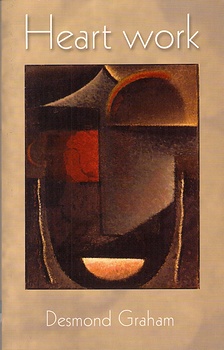Heart work
In this long sequence written with warmth and candour and seamlessly blending lyricism and narration, he sets out to confront the question, ‘What is it full of/the heart?’ Beginning in the Second World War, the sequence advances in diverse and unforeseen directions as it attempts to provide answers. Similarity and difference, the feared and the familiar, change shape. Historical and public events turn out not to be intrusions on private life but the element in which it is lived. Heart work is part memoir, part a quiet and often humorous account of the ‘growth of a poet’s mind’, part anguished contemplation of the struggle to sustain and celebrate sympathetic affection, but always a love poem. It builds, as an oratorio builds, through motif and counterpoint, through dramatic changes of pace and tone, to its surprising finale.
Poetry Book Society Recommendation Winter 2007; Selectors’ Comment:
Desmond Graham’s ‘Heart work’, a single poem in eight ‘books’, is an audacious answer to the question that opens Book One: ‘What is it full of/ the heart?’ In unpunctuated verse paragraphs of fluid, flexible short lines, mostly two or three stresses each – or a couple of heartbeats – Graham builds up, glancingly but urgently, the story of a lifetime’s attachments, from wartime childhood, through early adventures abroad, in Germany especially, marriage, fatherhood (not necessarily in that order), and an affair, onto a newly rewarding sense of freedom and fulfilment. Oblique narration, wry or lyrical, is punctuated by epiphanic moments in the poems’ movement forwards and back in time; different English and European landscapes, the poet’s persona as teacher and writer (deeply involved at one point with an unnamed ‘Poet at War’ who must surely be Keith Douglas, whose ‘Life’ Graham wrote and whose ‘Letters’ he edited) public events and private circumstance, are woven into a pattern that is as much musical as chronological. For although Graham at one point admits he ‘never found out/or why from so early/ my mind could weigh up the price/ adept as a bookmaker/ never a punter/ and my heart/ trying to make up for it/ by paying out/ over the odds,’ ‘Heart work’ is far from a straightforward weighing up, or any sort of accounting for a twentieth-century life. It is, rather, a set of vivid, engaging, life-affirming, colloquial and visionary variations: on the heart as metaphorical seat of the affections, its unpredictable swervings and mysterious purposes; on the actual heart ‘so hard at work/ so literal inside me;’ finally (and memorably) on the vulnerability of both: ‘how can you love/ so dangerously/ without choice?’
Poems from ‘Heart work’
Philosophers in Heidelberg
we climbed
two hundred steps maybe
with snow and ice
and at the top looked over
our own breath
to where snow clung
to the rooftops
and you couldn’t tell
fire smoke from mist
and the path in front
wound towards forest
and snow on snow
if we had embraced
the whole hillside
would have melted
an avalanche of rock
and ice and us
swept off our feet
instead we turned
hand in hand
like Milton’s characters
without knowing
back to the start
of a brand new book
[Book 5]
***
What can you say
when the gates close
when you are locked tight
as in a siding
no hope of getting off
and the whole night
fills its felt around you
but not warm enough
stuck between
wild weather
and the onward journey
he took out
bread and onion
handed plum brandy
round the lot of us
she reached for
fruit and afters
passed it round
and it was welcome
with a nod
or smile
and afterwards we slept
the whole train
stuttering
its passage
my eyes closing
to the sound of
‘Churchill’ ‘Churchill’
unsure whether
it was the engine
or my breath
or a neighbour
and whether
that one word
was welcome
or now I was asleep
a curse
[Book 6]
***
On the same film
where I saw a child
tucked tight and piping
a little fist or clench of hand
or knee bent and moving
stirring like a yoke in egg
I saw my heart
its great lilies mouthing
troubled cargo shifting
big lipped edges leaning
my life on it and hers
I saw what all along was in the engine
dropped its bungee jump
of fear and wonder
galloped towards distant mountains
slept there
sound as partridge
for the night
I button up my shirt
know I am aboard once more
the great wandering albatross
who six times already
rounded the Cape unseen
and barely noticed
still astride and flying
[Book 8]
